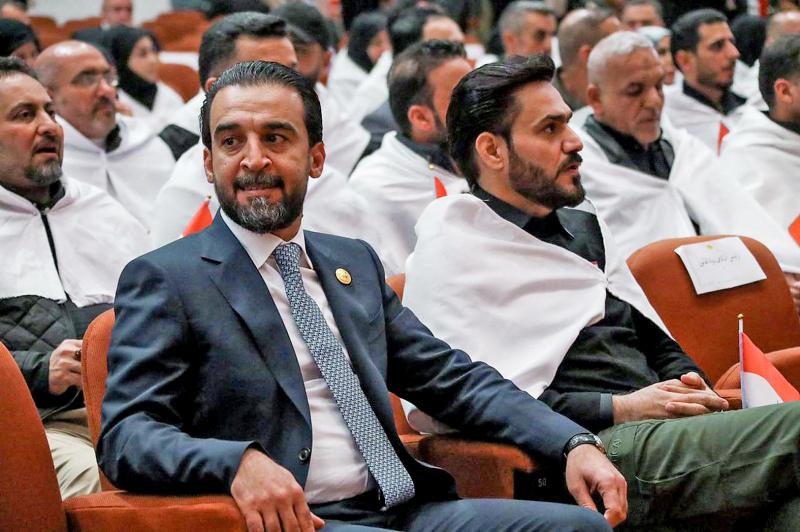The new Iraqi Council of Representatives on Sunday opened with a heated inaugural session, three tense months after legislative elections won by Shiite cleric Moqtada al-Sadr, the likely kingmaker of the next government.
Al-Sadr, 47, who once led an anti-US militia and who has a large following, is expected to have the key say in who is to serve as the next prime minister, a post held by Mustafa al-Kadhemi.
Sunday saw the swearing in of the 329 members of the unicameral parliament and the re-election of Iraqi Representative Mohammed al-Halbousi, who is Sunni, as speaker.

Photo: Reuters
However, a dispute broke out between lawmakers of the Shiite Coordination Framework coalition and their rivals under al-Sadr, several parliamentary sources said.
Iraq’s post-election period has been marred by high tensions, violence and allegations of voter fraud.
Iraqi Representative Mahmud al-Mashhadani, the oldest member of parliament who chaired Sunday’s session, was “hospitalized,” public television said.
Iraqi News Agency reported that he was in a “stable” condition, while a parliamentary source requesting anonymity said that al-Mashhadani “fainted.”
Videos filmed by lawmakers showed them fighting among themselves and the session was suspended for more than an hour before resuming.
Al-Sadr, who wears the black turban of a descendant of Islam’s Prophet Mohammed, emerged as the big winner of the polls on Oct. 10 last year.
The elections had been held several months early as a concession to a democracy movement.
Al-Sadr’s movement, which ran after he reversed an initial election boycott call, won 73 of the 329 seats.
Iraqi Representative Muthana Amin, who is Kurdish, said that Sunday’s session “began normally,” but that the Coordination Framework claimed it was the largest alliance in parliament, with 88 seats.
Mashhadani “asked for the information to be verified, after which he was abused,” Amin told reporters, without saying whether his hospitalization was linked to the incident.
Within 30 days of its inaugural session, the parliament must elect the president of the republic.
The new president must then appoint a premier, who is chosen by the largest coalition and has 30 days to form a government.
Some experts expect a new governing team in place by March for the oil-rich, but war-battered country of 40 million people.
Al-Sadr has repeatedly said that he wants to break with the Iraqi political tradition of a “consensus” government to instead build a majority government.
That would mean securing a ruling majority that would appoint a premier and a Cabinet from within its ranks.

The death of a former head of China’s one-child policy has been met not by tributes, but by castigation of the abandoned policy on social media this week. State media praised Peng Peiyun (彭珮雲), former head of China’s National Family Planning Commission from 1988 to 1998, as “an outstanding leader” in her work related to women and children. The reaction on Chinese social media to Peng’s death in Beijing on Sunday, just shy of her 96th birthday, was less positive. “Those children who were lost, naked, are waiting for you over there” in the afterlife, one person posted on China’s Sina Weibo platform. China’s

‘POLITICAL LOYALTY’: The move breaks with decades of precedent among US administrations, which have tended to leave career ambassadors in their posts US President Donald Trump’s administration has ordered dozens of US ambassadors to step down, people familiar with the matter said, a precedent-breaking recall that would leave embassies abroad without US Senate-confirmed leadership. The envoys, career diplomats who were almost all named to their jobs under former US president Joe Biden, were told over the phone in the past few days they needed to depart in the next few weeks, the people said. They would not be fired, but finding new roles would be a challenge given that many are far along in their careers and opportunities for senior diplomats can

Australian Prime Minister Anthony Albanese yesterday announced plans for a national bravery award to recognize civilians and first responders who confronted “the worst of evil” during an anti-Semitic terror attack that left 15 dead and has cast a heavy shadow over the nation’s holiday season. Albanese said he plans to establish a special honors system for those who placed themselves in harm’s way to help during the attack on a beachside Hanukkah celebration, like Ahmed al-Ahmed, a Syrian-Australian Muslim who disarmed one of the assailants before being wounded himself. Sajid Akram, who was killed by police during the Dec. 14 attack, and

RUSHED: The US pushed for the October deal to be ready for a ceremony with Trump, but sometimes it takes time to create an agreement that can hold, a Thai official said Defense officials from Thailand and Cambodia are to meet tomorrow to discuss the possibility of resuming a ceasefire between the two countries, Thailand’s top diplomat said yesterday, as border fighting entered a third week. A ceasefire agreement in October was rushed to ensure it could be witnessed by US President Donald Trump and lacked sufficient details to ensure the deal to end the armed conflict would hold, Thai Minister of Foreign Affairs Sihasak Phuangketkeow said after an ASEAN foreign ministers’ meeting in Kuala Lumpur. The two countries agreed to hold talks using their General Border Committee, an established bilateral mechanism, with Thailand